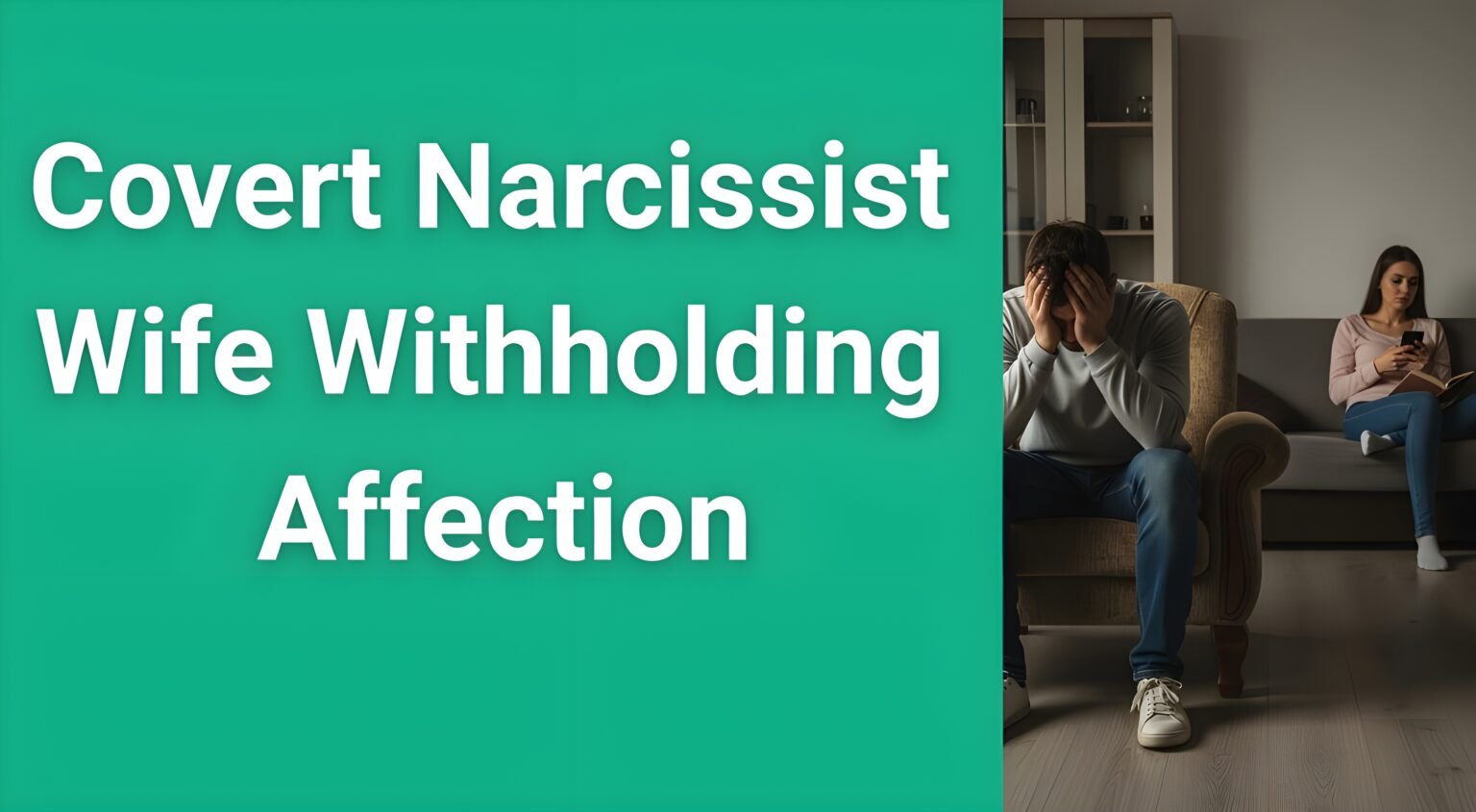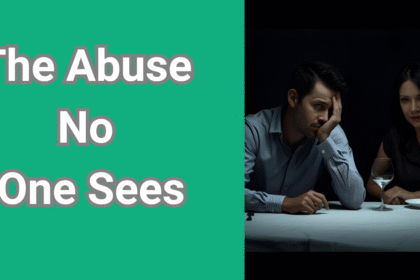You've been walking on eggshells for months, maybe even years. The woman you married used to be warm, attentive, and loving. Now? She's emotionally distant, rarely shows affection, and seems to withhold love whenever you need it most. If your covert narcissist wife withholding affection has become a painful pattern in your marriage, you're not alone—and you're not imagining things.
- What Does Emotional Withholding Look Like in Marriage?
- The Psychology Behind Why Covert Narcissists Withhold Love
- Seven Warning Signs Your Covert Narcissist Wife Uses Affection as a Control Weapon
- The Devastating Impact of Living with Emotional Withholding
- Why This Pattern Feels So Confusing and Addictive
- Breaking Free: Healthy Responses to Emotional Withholding
- When Professional Help Becomes Necessary
- Protecting Your Children from the Ripple Effects
- Building Emotional Resilience for the Long Term
- Frequently Asked Questions
- The Path Forward: Hope Beyond Emotional Manipulation
Unlike overt narcissists who demand attention loudly, covert narcissists operate in the shadows. They use emotional withholding as their weapon of choice, creating an invisible prison of confusion and self-doubt. This subtle form of psychological manipulation can destroy your sense of reality and leave you questioning your own worth.
The truth is, when a covert narcissist wife withholds affection, it's never really about you—it's about control, power, and feeding their fragile ego. Understanding this dynamic could be the key to reclaiming your emotional wellbeing.
What Does Emotional Withholding Look Like in Marriage?
Emotional withholding isn't simply having bad days or needing space. It's the deliberate restriction of affection, attention, and emotional availability as a tool for control. When your covert narcissist wife withholds affection, you might notice these specific behaviors:
She becomes physically distant, avoiding hugs, kisses, or even casual touch. The woman who once reached for your hand now sits on the opposite end of the couch, creating invisible barriers between you. Sexual intimacy becomes rare or feels transactional, like she's doing you a favor rather than sharing an intimate connection.
Communication turns cold and perfunctory. Conversations about your day, your feelings, or your relationship get shut down with phrases like “I don't want to talk about it” or “You're being too sensitive.” She masters the art of being present but completely unavailable, physically in the room but emotionally miles away.
Perhaps most confusingly, this emotional withdrawal comes in unpredictable cycles. Just when you've adjusted to the cold treatment, she might suddenly become warm and affectionate again, only to pull away without explanation days later. This creates a psychological pattern called intermittent reinforcement—the same mechanism that makes gambling addictive.
The Psychology Behind Why Covert Narcissists Withhold Love
Understanding the psychology behind this behavior helps you realize that your covert narcissist wife withholding affection isn't a reflection of your worth or your relationship's potential. It's a calculated manipulation tactic rooted in deep psychological needs.
Covert narcissists suffer from profound emotional insecurity beneath their carefully maintained facade. They desperately need to feel superior and in control, but unlike overt narcissists who seek attention through grandiose displays, they achieve this through subtle manipulation and control tactics.
Withholding affection serves multiple purposes for the covert narcissist. It punishes you for perceived slights or failures to meet their impossible standards. Maybe you forgot to compliment her appearance, spent time with friends she doesn't approve of, or achieved something that made her feel inadequate by comparison.
This emotional withdrawal also keeps you in a state of anxious attachment. When affection becomes scarce and unpredictable, you naturally begin working harder to earn it. You modify your behavior, walk on eggshells, and gradually lose yourself in the process of trying to win back her love.
The covert narcissist feeds off this dynamic. Your increased efforts to please her provide narcissistic supply—the validation and attention they crave—while maintaining their sense of superiority and control. It's a win-win situation for them and a devastating lose-lose for you.
Seven Warning Signs Your Covert Narcissist Wife Uses Affection as a Control Weapon
Recognizing the difference between normal relationship challenges and manipulative withholding can be crucial for your emotional survival. Here are seven clear indicators that your covert narcissist wife withholds affection as a control mechanism:
The Silent Treatment Becomes Her Go-To Response
Normal couples might need cooling-off periods during conflicts, but your wife uses silence as punishment. She'll ignore your attempts at conversation, give you the cold shoulder for days, and make you feel like you're living with a stranger. This isn't about processing emotions—it's about making you suffer until you comply with her unspoken demands.
Affection Arrives Only After You “Prove” Yourself
Love and affection feel conditional in your relationship. She becomes warm and engaging only after you've done something that benefits her or boosts her ego. Maybe she's affectionate after you've agreed to skip time with friends, complimented her excessively, or taken on extra responsibilities to make her life easier.
She Withholds During Your Vulnerable Moments
When you're going through a difficult time—job stress, family problems, or health issues—instead of offering support, she becomes even more distant. Covert narcissists often withdraw their affection when you need it most, leaving you feeling abandoned during life's challenges.
Physical Intimacy Becomes a Bargaining Chip
Sexual connection and physical affection are used as rewards or punishments based on your behavior. She might refuse physical closeness when she's unhappy with you, then use intimacy as a tool to get what she wants. This creates an unhealthy dynamic where physical connection feels transactional rather than loving.
She Blames You for Her Emotional Distance
When confronted about her cold behavior, she turns the tables and makes it your fault. Maybe I'd be more affectionate if you weren't so demanding” or “I can't show love when you're always criticizing me.” This gaslighting technique makes you question your own perceptions and take responsibility for her manipulative behavior.
Hot and Cold Cycles Become the Norm
Your relationship feels like an emotional roller coaster. Periods of warmth and connection are followed by inexplicable coldness and withdrawal. These cycles aren't related to external stressors or understandable relationship issues—they appear random and designed to keep you off-balance.
She Shows Affection Publicly But Withholds Privately
Your wife might be warm, engaging, and affectionate when others are watching, but becomes cold and distant when you're alone. This public facade maintains her image as a loving wife while privately controlling you through emotional deprivation.
The Devastating Impact of Living with Emotional Withholding
The effects of having a covert narcissist wife withholding affection extend far beyond temporary hurt feelings. This pattern of emotional manipulation creates lasting psychological damage that can persist long after the relationship ends.
Your self-esteem gradually erodes as you internalize the message that you're not worthy of consistent love and affection. You begin questioning your own needs and feelings, wondering if you're “too needy” or “too sensitive” for wanting emotional connection from your spouse. This self-doubt becomes a constant companion, affecting every area of your life.
Anxiety becomes your normal state as you constantly monitor her moods and behavior, trying to predict when the next period of emotional withdrawal might begin. You find yourself walking on eggshells, modifying your behavior to avoid triggering her disapproval, and losing touch with your authentic self in the process.
The unpredictable nature of affection in your relationship creates trauma bonding—a psychological phenomenon where you become addicted to the highs and lows of the relationship cycle. The occasional moments of warmth feel so precious after periods of coldness that they create a powerful emotional attachment, making it difficult to recognize or leave the unhealthy dynamic.
Social isolation often follows as you withdraw from friends and family who might question your relationship or make your wife jealous. You lose perspective on what healthy relationships look like and begin normalizing treatment that would have been unacceptable in the past.
Why This Pattern Feels So Confusing and Addictive
The confusion you feel about your covert narcissist wife withholding affection isn't a sign of weakness—it's the result of sophisticated psychological manipulation. Understanding why this pattern feels so addictive can help you break free from its grip.
Intermittent reinforcement is one of the most powerful conditioning tools in psychology. When rewards (in this case, love and affection) are given unpredictably, they create a stronger psychological bond than consistent positive treatment. This is why people become addicted to gambling, and it's why you can't seem to let go of those brief moments when your wife shows you warmth.
Your brain releases dopamine during those rare moments of connection, creating a biochemical reward that your mind desperately seeks to recreate. Between these moments, you experience withdrawal-like symptoms, increasing your motivation to work harder for the next “hit” of affection.
The unpredictability also triggers your attachment system. Humans are biologically programmed to pursue connection when it becomes threatened or uncertain. The more your wife withholds affection, the more your brain interprets this as a signal to pursue harder, creating a vicious cycle that serves her need for control.
Covert narcissists are skilled at maintaining just enough hope to keep you engaged. They might show brief glimpses of the person you fell in love with, promise to change, or blame their behavior on stress or outside circumstances. These moments of hope prevent you from fully recognizing the pattern or taking decisive action to protect yourself.
Breaking Free: Healthy Responses to Emotional Withholding
Recognizing that your covert narcissist wife withholding affection is a form of psychological manipulation is the first step toward reclaiming your emotional freedom. Here are practical strategies for protecting your wellbeing and responding effectively to this behavior:
Stop Pursuing When She Withdraws
Your natural instinct might be to chase after her affection when she becomes distant, but this only reinforces the manipulation. Instead, focus on your own activities and emotional wellbeing when she withdraws. This breaks the cycle where your pursuit feeds her need for control.
Document the Patterns
Keep a private journal noting when emotional withholding occurs and any potential triggers. This helps you see the manipulation clearly rather than getting lost in her explanations or gaslighting attempts. Patterns become obvious when you track them over time.
Build Your Support Network
Emotional withholding thrives in isolation. Reconnect with friends and family members who provide healthy, consistent emotional support. Share your experiences with trusted people who can offer perspective and remind you of your worth.
Set Clear Boundaries
Communicate your needs clearly and establish consequences for continued emotional manipulation. “I need affection and emotional connection in our marriage. If you continue withholding these, I'll need to consider other options for my wellbeing.” Follow through on your boundaries consistently.
Invest in Your Own Emotional Health
Stop making her emotional availability the center of your world. Pursue activities that bring you joy, maintain friendships that feed your soul, and consider individual therapy to process the effects of emotional manipulation. Your wellbeing shouldn't depend entirely on one person's unpredictable behavior.
If you're struggling to break free from these patterns, resources like the 30-Day Trauma Bond Recovery Workbook can provide structured guidance for healing from manipulative relationships. Sometimes professional support makes all the difference in recognizing your worth and building healthier relationship patterns.
When Professional Help Becomes Necessary
Living with a covert narcissist wife withholding affection creates complex psychological trauma that often requires professional intervention. Recognizing when to seek help can accelerate your healing and prevent long-term emotional damage.
Individual therapy becomes crucial when you find yourself constantly doubting your own perceptions, feeling anxious most of the time, or losing touch with your authentic self. A qualified therapist can help you process the effects of emotional manipulation and develop healthy coping strategies.
Couples therapy, however, can be risky when one partner has narcissistic traits. Covert narcissists often use therapy sessions as another opportunity for manipulation, turning the therapist against you or using therapeutic language to justify their behavior. Many experts recommend individual therapy first to build your strength and clarity.
Consider seeking professional help immediately if you're experiencing symptoms of depression, anxiety, or trauma-related responses like hypervigilance, emotional numbness, or intrusive thoughts about the relationship. These symptoms indicate that the emotional withholding has created genuine psychological damage that requires professional attention.
Support groups for narcissistic abuse survivors can also provide valuable validation and practical strategies. Connecting with others who understand this specific type of manipulation helps combat the isolation and self-doubt that emotional withholding creates.
Protecting Your Children from the Ripple Effects
When your covert narcissist wife withholding affection extends to the family dynamic, protecting your children becomes a crucial concern. Children absorb relationship patterns as models for their own future relationships, making intervention essential.
Covert narcissists often extend their emotional withholding to children, using affection as a reward for compliance and withdrawal as punishment for independence. Children learn that love is conditional and that they must perform to receive emotional connection—lessons that can damage their self-worth for decades.
Model healthy emotional expression and consistent love for your children, even when your wife is demonstrating the opposite. Children need to see that affection and emotional support aren't rewards to be earned but basic human needs that should be met consistently.
Validate your children's feelings if they express confusion about their mother's hot-and-cold behavior. Without badmouthing your wife, you can acknowledge that “sometimes people have trouble showing their feelings consistently” and reassure them that this isn't their fault.
Consider family therapy with a professional who understands narcissistic dynamics if your children are showing signs of anxiety, perfectionism, or difficulty with emotional regulation. Early intervention can prevent the intergenerational transmission of unhealthy relationship patterns.
Building Emotional Resilience for the Long Term
Recovery from living with a covert narcissist wife withholding affection requires rebuilding your emotional foundation from the ground up. This process takes time, patience, and intentional effort to develop healthier relationship patterns.
Learn to recognize your own emotions without external validation. Emotional withholding trains you to look outside yourself for confirmation of your feelings and worth. Practice identifying what you feel, need, and want without requiring her approval or acknowledgment.
Develop secure attachment patterns through healthy relationships with friends, family, and potentially new romantic partners in the future. Secure attachment means knowing that love doesn't have to be earned, that affection can be consistent, and that your needs matter in relationships.
Create boundaries around your emotional energy and attention. After years of having your emotional resources exploited, learning to invest in relationships that provide mutual respect and consistent care becomes a crucial life skill.
The Narcissistic Abuse Clarity Report can help you gain perspective on these relationship dynamics and understand how emotional manipulation has affected your worldview. Sometimes gaining clarity about what you've experienced is the first step toward building something healthier.
Frequently Asked Questions
Intentional withholding follows patterns and serves as punishment or control. It typically increases after you've asserted independence, had success, or failed to meet unspoken expectations, while genuine difficulty shows consistent communication about feelings.
Real change requires genuine recognition of the problem and professional intervention. Most covert narcissists lack the self-awareness and motivation needed for meaningful change, instead making temporary improvements to maintain control.
Focus on specific behaviors rather than labels. Describe patterns like “she becomes distant when I spend time with friends” rather than “she's a narcissist.” Keep documentation to maintain your own reality.
Normal coldness has identifiable causes, involves communication about problems, and includes willingness to work toward resolution. Narcissistic withholding is punitive, unpredictable, and designed to maintain control rather than resolve issues
The Path Forward: Hope Beyond Emotional Manipulation
Understanding that your covert narcissist wife withholding affection is a form of psychological manipulation, not a reflection of your worth, opens the door to healing and healthier relationships. Recognition is the first step toward reclaiming your emotional freedom.
Whether you choose to work on your current relationship with proper professional support, establish stronger boundaries to protect yourself, or ultimately decide that leaving is necessary for your wellbeing, remember that consistent, unconditional love is possible. You deserve affection that doesn't come with strings attached.
The journey from emotional manipulation to emotional freedom isn't easy, but thousands of people have walked this path successfully. With proper support, clear boundaries, and commitment to your own healing, you can build relationships based on mutual respect rather than control and manipulation.
Your emotional needs aren't “too much.” Your desire for consistent affection isn't “needy.” Your confusion about this treatment isn't weakness. It's a normal response to abnormal behavior, and recognizing this truth is the foundation for building a healthier, more fulfilling future.
Remember, healing from emotional withholding takes time, but every step toward recognizing your worth and demanding healthy treatment is a step toward freedom. You have the strength to break these patterns and create the loving relationships you deserve.





